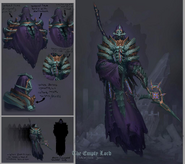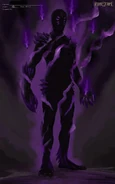Template:RSC page
Zaros (pronounced "ZÀ-ross"[2]) is the god of control and fate, and the divine aspect of dark energy. He is an extremely powerful entity whose power is close to that of Guthix.[3] His ways are characterised as Machiavellian, 'empty' and manipulative. He is sometimes associated with shadow, emptiness, fate and absence.[2] When the World Guardian first meets Zaros, he says that these are merely the impressions of others on him, and that the adventurer should judge Zaros based only on his own actions and words.
Unlike any of the other younger gods, Zaros was never a mortal; he has never been anything else but a divine being. Zaros, along with Seren, was created by the Elder God Mah near the very beginning of the universe. He was to represent Dark energy while Seren was to represent Light energy. They were tied to each other in ways neither could control. It was a mutual "attraction" of sorts that weakened Zaros' concentration and Seren's will in order to bring them together. Mah, with the temperament of a child saw them as her "playthings", in a sense. However, Zaros resented this. He longed to escape and create his own destiny; to create his own fate. Seren, on the other hand, felt it was their duty to remain with Mah. She felt that Mah needed them and only created them out of the fear of being alone.
In the end, Zaros abandoned both Mah and Seren. He set out to search the stars for whatever he may find. The first world he came to was that of Infernus.
Zaros wants the world to belong to mortals similar to Guthix, but believes that mortals would neither be safe nor capable of living without the guidance of gods, who are able to set some rules and exercise proper control; otherwise, everything would turn to chaos. As such, he suggests that he watches silently, making checks and balances to ensure 'balance' is maintained. He once wished to become fate itself, to control the lives of mortals. However, in the time since his banishment, Zaros has contemplated this and now wishes to be more of a guide for mortals. In essence to act as a form of consciousness so as to push them towards greatness and to protect them from harm.
Zaros' arrival in Gielinor was one of the most important events of the early Second Age. During this age, he ruled a vast empire of hitherto unrivalled size, stretching from the borders of the Troll Country and the Frozen Wastes to Kharyrll, bordering the Hallowland, and from Ghorrock by the Northern Sea to the northern cliffs of the Kharidian Lands in the south. From his arrival, which was some time after Guthix's first descent into the earth and subsequent sleep, and until his downfall at the hands of Zamorak, Zaros was one of the most powerful gods known to Gielinor, both in personal power and influence. Even millennia after his defeat, the few people aware of his existence are aware of his immense might and the gods familiar with him express great fear at his name.[4] The very few present-day Saradominists and Zamorakians who possess knowledge of Zaros consider him an adversary. For instance, the legendary adventurer Dionysius becomes furious upon hearing his name.[5] Others, like certain inhabitants of the Kharidian Desert, and some Mahjarrat, still worship Zaros as their lord.
He is the patron of the Ancient Magicks and Ancient Curses, and is strongly associated with conquest and domination. Zaros only recently regained contact with his followers on Gielinor by way of a communion portal, before returning to Gielinor from Freneskae.
Religion
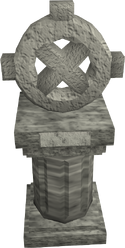
The symbol of Zaros on a gravestone.
The symbol of Zaros is a circle with four small, rounded juts pointing outwards surrounding a Greek (equidistant) cross, and is usually found as ornament on Zarosian artefacts and clothing, as well as Zarosian fortresses such as Viggora's Fortress. Unlike some gods, such as Saradomin and Armadyl, who derived their symbols from Elder Artefacts, Zaros' symbol is his own creation. Its meaning and what it represents however, is unknown.[6] Zaros' colour seems to be various shades of purple, although cream and gold dominated the temple of Senntisten. The Zarosian religion makes extensive use of the Infernal language, which was taken from the original inhabitants of Infernus.[7] Although it is also used in other instances nowadays, albeit rarely, it is originally a demonic language which became the official Zarosian tongue and the non-Zarosian groups and individuals using it, such as the Kinshra or Dionysius, may be unaware of its origins.
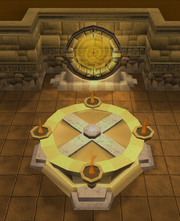
The altar of Zaros in the Senntisten temple.
Zaros' goal is to guide Gielinor from the shadows, pushing it towards greatness and protecting it from harm. Upon arrival to the planet in the Second Age, he deemed establishing a large empire with massive armies the best way to achieve this. However, this eventually led to a rebellion and his own defeat. As such, he has chosen a different means of accomplishing his goal upon return, trying to rule as an unseen but omnipresent power and keeping only a small number of trusted followers.[8]
Moral alignment
| “ | It is my belief that everything that occurs in life - both good and bad - should be used to forge oneself, to better oneself. Where Guthix sought balance in the world, I seek balance in oneself. | ” |
— Zaros
|
Due to his conquering of land and initiating of many wars in the Second Age, Zaros has often been called an evil god by followers of the gods who aided in his attempted damnatio memoriae, given that history is often written to suit the dominant party's views. Few people know of Zaros today but those who do not follow him usually regard him as evil and something to be feared. However, it should be noted that his intention is not one of malevolence, unlike, for instance, Bandos, god of war. As a result of never being mortal, Zaros's emotions are beyond mortal understanding; in other words, he will attempt to achieve his goals by whatever means, oblivious to, and unfamiliar with mortal concepts such as remorse, hatred, greed, ruthlessness, evil or good.[8] This contrasts with Saradomin, for example, who adopts a similar consequentialist philosophy, but is capable of considering the ethics of his actions, unlike Zaros. As such the often said statement that Zaros' morality is disputed is not fully accurate, for he possesses no sense of morality at all. This, along with his gradual retreat from public eye in the Second Age, is the most likely source of his being associated with emptiness and his title of The Empty Lord.
Zaros' followers, however, differ greatly in morality. Some of Zaros' followers may be called evil in the conventional sense of being ruthless, enjoying being deceptive and seeking power for power's sake. In addition, the Ancient Curses and Ancient Magicks, the Zarosian patron prayers and spells respectively, seem to be highly combative in nature as they focus on inflicting damage on others and draining them of their powers. Saradominists have claimed that the "evil" nature of the Second-Age-Zarosians, most likely referring to traditionally hostile races such as demons and vampyres, is to blame on the god himself, stating that he willingly allied himself with them.[9] Queen Senliten, who aided in defending her empire from Zaros' armies, has described him as an ever-plotting vile creature. However, as noted before, he was not aware (nor had he the ability to be) of the alleged cruelty of his followers' actions. He used them because they served him well, and for no other reason.
History
Origins

Zaros' creator, Mah, asleep.
Zaros was created on Freneskae by Mah, the youngest of the elder gods.[10] After her abandonment by the other elder gods, Mah climbed out of Freneskae's volcano and instinctively created both Zaros, the divine aspect of dark energy, and Seren, his light opposite, with the little energy she had. Seeing that Mah's birth resulted in her lacking any intelligence above primitive instincts due to the world's lacking anima, she was unable to teach Zaros anything and treated her creations as toys more than anything.[11]
He felt only resentment towards his cruel creator and desired to leave her. However, he also felt attracted to Seren, being her opposite, and she was interested in him as well. When close to each other, intense feelings towards the other would be triggered in both gods, breaking Zaros' concentration. He suspected this to be a measure applied to them by Mah to coerce them to stay with her, but he eventually abandoned her and Freneskae while she was sleeping. Seren chose to remain, taking care of Mah on the grounds that she owed her creation to her.
After Zaros left, Mah would often cry out for him, with Seren able to do little to comfort her. She also created sentient life in the form of various tribes.
Journey to Infernus
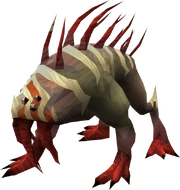
A virius, a subspecies of Chthonians who joined Zaros.
After fleeing from Mah, Zaros traversed hundreds of other, primordial, realms, eventually stumbling across Infernus. There, he encountered the first intelligent life he had seen other than himself, Mah, and Seren. The creatures he saw were demons and he took note of their intricate culture and language, both concepts that had been foreign to him before encountering them.
Either on his first visit, or at a later time, he approached the demons' leader, a massive Chthonian called Hostilius the Autocrat, who had devoured many Infernals during the Chthonian Rebellion, and requested twelve demonic legions in return for teaching the demons how to travel between worlds, so that they could attack and eat inhabitants of other realms rather than each other.[12]
Hostilius, who had accumulated significant intelligence due to absorbing the knowledge of his victims, decided to trick Zaros, in spite of easily being able to miss twelve legions. After many slick discussions, the demon set up an unbreakable contract - the deal involved the twelve legions and the knowledge being given to the eldest signatory, whom Hostilius assumed to be himself. Although Zaros immediately noticed the deception, he signed the contract regardless.[13] While the demon erupted in laughter at his own brilliance, Zaros spoke to the demonic crowd of his origins and how Zaros had been created aeons before Hostilius even spawned, and Hostilius fell quiet as he realised he himself had been tricked.
As a result, Zaros, the eldest signatory, received twelve legions while the humbled Hostilius got nothing in return.[14] The legions, consisting of Chthonian nobles (known as Dukes) leading their Avernic slaves, would give Zaros tremendous miltary power, exceeding that of any other god.[15]
Traversing the Multiverse
After visiting Infernus, Zaros headed to a realm he named Vampyrium, where he observed vampyres living as feral beasts and preying on the weaker creatures in packs. Seeing their method of feeding as inefficient, Zaros introduced society and culture, both of which he had learnt from the Chthonians, to the vampyres, giving rise to a nobility class which exists to the current day. In gratitude, the vampyres swore allegiance to him.
From Vampyrium, Zaros went to the other planes, and eventually encountered the four paths the other elder gods had taken, calling their destination the Elemental Planes. There, he encountered other gods; ascendant mortals. He attempted to recruit these other gods to his cause, but was rebuffed, at times violently. Nor did he have much luck in convincing the mortal followers of these gods to join his cause.
Arrival to Gielinor

Zaros finding Gielinor in the Second Age.
Eventually, Zaros arrived to Gielinor, more commonly known as RuneScape, around the beginning of its Second Age. This occurred relatively soon after Guthix, the god who had shaped Gielinor, had entered his first sleep. Although Zaros knew of Guthix, though only vaguely from Guthix's few, rare followers, Guthix had no knowledge of Zaros at all.[8][16] He and his armies arrived near the town of Senntisten, which, along with its surrounding villages, was ruled by a powerful god with several heads, Loarnab, although it was of limited intelligence.[17] Zaros' forces attacked Loarnab and trapped the god before Zaros used his magic to transform it into a living power source. This feat, coupled with the mere sight of Zaros' might, led the inhabitants of Senntisten to immediately accept him as their new ruler. He proceeded to conquer more territory, although Senntisten would remain the capital of his lands.[18] He would never engage in direct combat himself after the encounter with Loarnab, leading his armies passively instead.[19]
Soon enough Zaros began building a large empire in and around the continent known as Forinthry. Many humans joined his side, if only because his ever-growing armies conquered territory owned by other deities such as Saradomin. Zaros wanted to unite all the gods for his cause aswell, but soon found out that gods were not as easy as mortals to bend to his will, and thus none of the other gods rallied to his cause.
Building an Empire
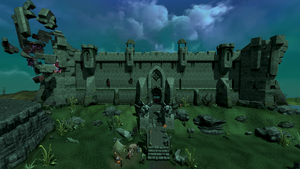
The fortress of Viggora, a human general who lived in the final years of the Second Age.
Over the course of several centuries, Zaros' empire grew to massive size, stretching more land than any kingdom ever established since, and the god ruled with force, aiming to put the entirety of Gielinor under his control. Its capital remained Senntisten, a large city in the south of the empire and the most advanced settlement of its time, possibly rivalling the elven city Prifddinas. It was also the centre of Zarosian worship, housing a renowned temple to the god in addition to at least one basilica. Other fortresses and cities rose from the ground as well, scattered throughout the empire, the most notable of which are Ghorrock, north of the Troll Country, Carrallangar, Dareeyak, Paddewwa, Kharyrll, bordering the Saradominist Hallowland, and Annakarl.
The empire was constantly expanded through campaigns to the south, west and east, which were usually successful. Soon enough, the other gods came to despise and fear Zaros in equal measure. Although they could have taken him down in an alliance, their fear for him as well as disagreements with each other presumably prevented this from happening.[20] Early on in the Second Age, Zaros managed to take control of the World Gate, stealing it from the elves in Tirannwn, and sealed it for an unknown reason.[21][22]
However, the constant warfare and dominance of aggressive and hostile races such as demons made for poor living conditions for those in the lower-class of society, most notably for the humans living under Zaros. Although they had access to better technology and magic than, for example, the humans living in Hallowvale, life in his empire was generally dangerous and unsatisfactory.[23] Additionally, humans were considered the lowliest of the Zarosian races, not dissimilar to goblins in the army of Bandos, and often looked down upon, with even the Avernic demons enjoying a better life than most humans.[24] It was not unheard of for homeless humans to be eaten by Chthonian demons, and despite being against the law, Zaros was seemingly unaware of this, and it was ignored by those in the higher tiers of society.[25].
Despite this, better-off humans such as the the priests and merchants in Senntisten, had more reasonable lives as the city grew ever larger. Its original inhabitants were converted into his clergy and educated in matters such as religion, law and the language of the Infernal demons. The city would always be the first to benefit of advances in fields such as agriculture, engineering and architecture. Centuries later, it was described as follows by Akthanakos:
Great halls and towers and aqueducts sprang up over the city and the lands around were filled with efficient, irrigated fields, mills, jennies and straight, well-maintained roads. The population continued to rise uncontrollably and the proportion that belonged to the clergy or the military fell and fell. More and more so, the humans devoted themselves to the provision of luxury and services for each other. The city had become its own purpose, not just an administrative centre but a great living creature in the centre of the empire.
Akthanakos[26]
At some point, Zaros discovered the Ilujanka, a race of infertile reptilian humanoids riding creatures known as gurh in Iaia, a realm very different to Gielinor, both geologically and culturally; it was a peaceful world, with no need for conflict. Eventually, after some time observing them, Zaros came before them, and offered them to join his army on Gielinor in return for a cure to their infertility. Faced with the promised prospect of the return of childbearing to their race, some of them accepted Zaros' offer and accompanied to Gielinor through a portal. Adapting quickly to the ways their new world worked, learning the concepts of combat, war, betrayal, loyalty, and lies, they began to tame dragons instead of gurh and thus became known as the Dragon Riders. Over time, they proved to be formidable soldiers, becoming feared by Zaros' enemies. Yet despite this, Zaros did not deliver on his original promise, and with their infertility still an issue, the Dragon Riders' numbers gradually diminished, never to increase again, until by the end of the Second Age only five of them would remain: Hannibus, Morvannon, Apropos, Balustan, and Ablenkian.
Clash with the Menaphites

Jhallan, at the time a relatively powerful Mahjarrat who came to follow Zaros loyally.
At one point, Zaros launched a campaign to the south in an attempt to add the Kharidian Empire, ruled by the Menaphite Pantheon, to his empire. The Menaphites assembled an army, supplemented with mercenaries, to fight back but the overwhelming Zarosian forces proved too powerful. Therefore, Icthlarin, god of the dead, and his sister Amascut, set out to other planes in the hopes of finding allies who would be strong enough to defend his lands in the Kharidian - Zarosian War. He found these allies on Freneskae, realm of constant warfare, where he made a deal with the Mahjarrat; a tribe of extremely powerful magicians and creations of Mother Mah. After a bloody battle between supporters and opposers of the proposition, the Mahjarrat agreed to venture to RuneScape with Icthlarin and defend the Kharidian Empire in return for the promise to revel in bloodshed, never to return to Freneskae.[27]
Icthlarin and his 'Stern Judges' arrived in the midst of battle and the Mahjarrat immediately vanquished the Zarosian troops with little effort. With their help, the Menaphites were able to stop the Zarosians' advancing and pushed them back to the northern fortress Kharid-et over the course of several years. However, the Zarosian commander, Duke Ceres offered the Mahjarrat to join his side instead. The Mahjarrat Sliske, who had got into a feud with Icthlarin, agreed to join him and the Mahjarrat convened to discuss the offer.[28]
Some of the Mahjarrat argued that, in line with their traditions on Freneskae, a sacrifice should be made to appease Mother Mah through the Ritual of Rejuvenation, although they were far from Mah's volcano and the ritual marker was absent as well. Azzanadra explained the history of his tribe and the purpose of their rituals to Zaros, who immediately understood how the marker functioned and agreed to create another for them.[29][30]
The Mahjarrat performed their ritual and sacrificed one of their own. Zaros explained that the sacrifice's energy had not gone to Mother Mah, whose existence he did not doubt, but had instead been dispersed among themselves. He also revealed that, on Gielinor, the Mahjarrat would have to perform rituals regularly to replenish their slowly withering powers and avoid dying, and advised do hold them every five hundred years. Later, the ritual would coincide with syzygy on Wahisietel's suggestion and the marker would be moved to an icy plateau near the fortress Ghorrock. Zaros' deep understanding of their tribe was a major factor in the decision of most of the tribe to join him.[31]
The Mahjarrat emerged from Kharid-et and joined arms with the Zarosian legion, attacking the Kharidian warriors, who fled to the south.[32] During their pursuit, however, Tumeken, god of light and head of the Menaphite Pantheon, interfered. Sacrificing himself and his own army, Tumeken exploded in a massive blast which completely obliterated his own army, half of his army and the entirety of the Zarosian legion. Only a few dozen Mahjarrat were spared because Azzanadra had erected a protective barrier around them, while around four hundred others had died, along with the remainder of Zaros' troops. Wounded and exhausted, the Mahjarrat retreated to Forinthry.[33]
In accordance with their merit, Zaros granted the Mahjarrat high positions in his army and priesthood. Many became tribunes and pontifices, with four - Hazeel, Wahisietel, Zamorak and Zemouregal - being given the rank of legate and thus leadership of an entire legion. A few years later, Azzanadra became Pontifex Maximus, leading the entire Zarosian clergy. To avoid an internal conflict, Zamorak was lifted to Legatus Maximus. Zaros also formed a secret police in Senntisten, the Praetorian Guard, led by Sliske and Trindine. The former became Praefectus Praetorio for liberating the Mahjarrat from Icthlarin, and was known to abuse his position for his own amusement, being known to force "unwanted" humans to wear masks and kill each-ther as part of a sadistic play for the highest echlons of Zarosian society to enjoy, although he quickly grew bored of it. Those who disagreed with Sliske's actions didn't speak up for fear of social disgrace, or being subject to the inquisition of the Praetorians.[34][35]
His ranks supplied by the immensely powerful Mahjarrat, Zaros became practically unstoppable. His empire would continue to expand, becoming the greatest the world would ever see.
Growing rebellion
As his plans of domination began to come to fruition, Zaros showed himself less and less until he was seen only very rarely outside his castle, where he communicated only with his closest followers such as Azzanadra, Char and Zamorak. This absence combined with his tremendous power earnt him the title of "Empty Lord" and he became shrouded in mystery.
Eventually, nearly two millennia after Zaros' arrival, some of his followers began to grow dissatisfied with the strict regime and poor living conditions. Most notable amongst these was General Zamorak the Scourge, the most powerful of the Mahjarrat. Along with other members of his race, such as Lucien, Enakhra, Hazeel and Zemouregal, as well as other powerful Zarosians, such as the elder demon Thammaron, the human Viggora and the vampyre Lord Lowerniel Drakan, he began planning a rebellion against Zaros, hoping to usurp his master and rule for himself, hungry for power. On a mission to the Fremennik Province, he took the journal of the scribe Perjour, which directly communicated his thoughts to Zaros, and substituted it with a fake duplicate, thus preventing the Empty Lord from finding out about his plans. And, even though Zaros did not fully trust Zamorak,[36] he did not suspect any betrayal.
He also began to eradicate opposition. For example, during a mission to Prifddinas to spy on Seren, the elven goddess in whom Zaros seemed to express significant interest,[37] Zamorak attacked the auspah Char during an elven ambush and poisoned her, thus preventing her from stopping his plans and providing her with a slow and painful death. However, Char powered down and entered a magical sleep, allowing her to resists the poison's effect for millennia.
Despite this, Zamorak's rebellion would not have succeeded due to his master's immense power. However, when he managed to obtain the legendary Staff of Armadyl, the tides turned. The staff had been taken from its temple by the explorer Valdez, who planned to give it to Saradomin, until he was robbed by a thief named Rennard, who decided to sell the staff to Zaros and sent a messenger, Kharrim, to deliver the news. Kharrim was part of Zamorak's conspiracy however, and went to the Mahjarrat instead, who was able to buy the staff from Rennard for a bargain. Being in possession an Elder Artefact, Zamorak's powers were increased sufficiently to be able to stand against Zaros.
Zamorak was aided further when Lennissa, a Saradominist spy in Zaros' camp, found out about his possession of the staff and informed her superior, the Wizard Dhalak. Figuring that Saradomin would benefit from Zaros being defeated, Dhalak cast a concealing spell on the staff, enabling Zamorak to sheathe it without the Zarosian loyalists detecting it, rather than informing his god. After securing the services of Morvannon and Apropos, two of the last five Dragon Riders, and somehow obtaining the Stone of Jas itself, Zamorak and his followers made their move.
Defeat by Zamorak
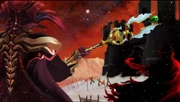
Zamorak faces Zaros in his citadel.
Under the pretence of discussing war plans, Zamorak - powered up by the Stone -, Hazeel, Zemouregal, Lowerniel, Viggora and Thammaron approached Zaros' fortress and went inside. There, Zamorak revealed the Staff of Armadyl and struck it into his master's back while his cohorts engaged in combat with his bodyguards. The events that followed are described by General Viggora as follows:
While we distracted the Empty Lord with our feints and attacks, and kept his bodyguards busy, Lord Zamorak outflanked him, unsheathed the staff and plunged it into his back! [...] The Empty Lord turned away from our battle, eyes burning with hatred, and towards Zamorak instead. Seeing this, we all fought with extra vigour, so that General Zamorak would not face our lord alone, but we were outnumbered by many hundreds of warriors and demons, and could not reach him to assist him. [...] The Empty Lord was a powerful god, stronger than any of the others awake at the time, possibly even as strong as Guthix is, and Zamorak was but a mortal: a Mahjarrat warrior all the same, with all of the strength and power that that entails, but mortal nonetheless, but to see him fight, you would not think of him as a ‘mere’ anything… He was war itself! Flurry after flurry of blows he rained upon the Empty Lord, and the very castle walls shook and quivered with their power, but the Empty Lord would not fall! Even with the weapon of a god embedded in his back, he fought on, and with each blow our victory seemed less and less certain…
Viggora
Even with the Staff sticking out of his back, Zaros fought Zamorak and overpowered him, lifting his former general into the air and proceeding to choke him as the Mahjarrat was screaming and kicking defiantly. It is likely that, aside from the physical battle, the two beings were also involved in a mental clash, unperceivable by 'simpler' beings such as humans.[38] However, at that moment, Zaros "lost his footing", according to Viggora, and fell over, which caused the Staff, still sticking out of his back, to impale Zamorak as well. What exactly happened remains a mystery, although it is quite unlikely that the god simply tripped, as Viggora believes.[39] It is unknown if Viggoras accounts can be trusted as Zaros revealed that only he and Zamorak were present at the time of his fall. At that moment, by pure chance, a great part of Zaros' divine power was transferred into Zamorak with the staff as conduit.
Realising he was going to die, Zaros abandoned his body in a bright flash followed by cold darkness and his spirit left the scene as his body began to fade from existence, while Zamorak's newly acquired power made him seem more present than before. As Zaros, now incorporeal, was fleeing, he uttered a powerful curse, perceived as a "whisper upon the wind", which affected all those who had played a role in his betrayal. Although powerful magical beings such as Mahjarrat, demons and vampyres were not visibly afflicted by the curse, the humans, including Valdez, Rennard, Kharrim, Lennissa, Dhalak and Viggora, were and as such they too faded from the material realm and were trapped for eternity in the Shadow Realm.
Zamorak, tired and in agony, had collapsed on the floor. The Avernic demons gathered around Zamorak, lifted him up and took him to Infernus through a portal in order to let Zamorak complete his deal to the Avernic demons who aided him in his plot to overthrow Zaros. Zamorak in turn aided the Avernic demons in their rebeliion against their masters, and returned triumphant to Gielinor nineteen years later, now a god himself. Upon seeing that Saradomin had taken the stone and Armadyl the staff, Zamorak declared war on both of them, throwing the world into a war of gods.[40]
Diminishing of Zarosian following
Throughout the Third, Fourth and Fifth Ages, Zaros' spirit travelled the multiverse and ventured far away from Gielinor. He eventually arrived on Freneskae, the Mahjarrat's homeworld, where he would indefinitely remain.[41] In this state, he did not have the ability to think or perceive anything, and through a slow process only was he able to recover his power and restore his mind through means currently unknown.[8]
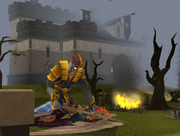
The Battle of Annakarl in 3100, wherein Saradominists and Zamorakians fought over Annakarl.
Meanwhile, the Zarosian Extermination was performed mainly by Zamorakians and Saradominists throughout the entirety of the Gielinorian God Wars; in an attempt to completely wipe all memory of the Empty Lord from the world, the Zarosian settlements were systematically attacked and destroyed. Zarosians themselves were persecuted; those who did not flee to safe harbours such as Senntisten, which would remain safe from attacks until the final few centuries of the wars, were mercilessly slaughtered. However, most of them remained faithful, believing Zaros to be ruling from the Shadow Realm rather than dead, and high-ranked Zarosians such as archbishop Ayanetka urged the others to remain vigilant. All dragon riders but Hannibus, who managed to escape to the cave in which his race had first stepped foot on RuneScape, were assassinated, having been branded traitors.

A mural depicting the Zarosians attempting to reestablish contact with their lord.
Indeed, the Zarosians did not lose their faith. Mahjarrat such as Wahisietel and Azzanadra, whose prowess in battle and unconditional loyalty had earnt him the title 'Champion of Zaros', defended the Zarosian settlements with relative success. Nex, a terrifying and exceptionally powerful monster leading the army of Zaros, defended the Mahjarrat ritual marker in the Battle for the Ritual Site but was lured into a cave by the opposing army of Saradomin, where Nex and her troops were imprisoned beneath the Temple of Lost Ancients for centuries. Meanwhile, Azzanadra attempted to re-establish contact with Zaros from Senntisten, to no avail.
Towards the end of the wars, however, the Zarosians were unable to persevere. During the Battle for the Godsword, the Zarosian Mahjarrat Sliske tricked a group of Saradominists into releasing Nex from her prison before disappearing, but an alliance between Saradomin, Zamorak, Bandos and Armadyl magically sealed her once more. Azzanadra fell to a Zamorakian-Saradominist alliance and was imprisoned in the Jaldraocht Pyramid in the Kharidian Desert.[42] Before he was imprisoned, however, he provided Sliske with an artefact for safekeeping, which would allow them to re-establish contact with Zaros later.[43] Around 3700, Wahisietel's attempts to make the Zamorakian and Saradominist besiegers of Senntisten turn on one another failed, prompting priest-king Dagroda to order the city's immediate evacuation, believing that its fall was plan of Zaros' "grand scheme". As the Zarosians fled to Ghorrock, Dareeyak and Carrallangar, the only fortresses to remain standing, Senntisten was taken over by Zamorakians and utterly levelled by Saradominists a century later, who built a new city on top of it; Saranthium.

The ruins of Dareeyak following the annihilation of Forinthry.
When Guthix awoke from his slumber and ended the God Wars another two centuries later, he established the Edicts of Guthix and banished nearly all gods from the planet. By this time, Zamorak had utterly destroyed Forinthry with the aid of the Stone of Jas, completely laying waste to all Zarosian fortresses except for Ghorrock, which housed a small number of Zarosian refugees led by matriarch Lamarinta. As such, the Zarosian Extermination had not been completely successful; although most inhabitants of Gielinor had forgotten him and those who hadn't did not dare utter his name, he was still worshipped, even though his followers had been reduced to the colony in Ghorrock and a camp of bandits in the desert.
Only in the Fourth Age did the few remaining Zarosians realise that Zaros was not ruling from the Shadow Realm, but had truly gone.[44] By the end of the age, knowledge of Zaros had almost completely disappeared, save for his very scarce followers. The god himself slowly regained his power as well as the ability to think.[8]
Communication restored
In 169 of the Fifth Age, an adventurer and newly qualified archaeologist working for the Varrock Museum discovered the ruins of the Senntisten Temple in the digsite east of the city. They found a Zarosian talisman and a stone tablet with Zaros' name there which are now on display in the museum, thus returning knowledge of Zaros to the world, to a small extent.
Some time later, the same adventurer was recruited by Eblis, leader of the desert bandits, to release Azzanadra from Jaldraocht. They defeated three of the Guardians of the Diamonds of Azzanadra, the fourth giving up his diamond in return for a favour, and opened the pyramid. Azzanadra, who had lost track of time and turned into a ghostly being, was shocked to learn that the God Wars were over and that Zaros had disappeared from his mind as well as the dominance of Saradominism and Zamorakianism in addition to the existence of Guthix before leaving to plan.[45] The adventurer also released Akthanakos, another Zarosian Mahjarrat, from the grip of his rival Enakhra in the latter's temple.

The disguised Azzanadra in the renovated temple making contact with Zaros.
Azzanadra and Wahisietel began to plan and requested the adventurer's help in rebuilding the Senntisten Temple to establish contact with Zaros. Disguised as the human archaeologist Dr Nabanik, Azzanadra acquired clearance to renovate the temple with his new ally's help and oversaw its reconstruction by Kharidian workmen. He had an adventurer retrieve the frostenhorn from Ghorrock, the Barrows icon from the Barrows and another ancient relic which an accomplice had taken from Entrana. With these items, Azzanadra was able to create a communion portal, of which the magic could be amplified to reach even the farthest and most distant realms. He contacted Zaros, who made contact with Gielinor for the first time in millennia. After rewarding Azzanadra for his efforts, the two began to plan the god's return in secrecy. A significant problem was that Zaros was still incorporeal, and would require a body, even though he had more than regained his former power at this time.

Azzanadra, Akthanakos, Wahisietel, Char and Nex argue with the other factions about the fate of Guthix.
Some time later that same year, tectonic activity caused the magical seal imprisoning Nex to weaken, making the Ancient Prison accessible. Char was also restored in her cave near the Galarpos Mountains. At the very end of the year, after the eighteenth Ritual of Rejuvenation which saw the sacrifice of Jhallan, the resting place of Guthix himself was discovered and various factions raced inside to claim the kill, for Guthix' death would allow their respective gods to return to Gielinor. The Zarosian Mahjarrat, Char, and Nex convened and decided that Guthix should be woken and bargained with rather than killed, and Sliske enlisted the adventurer's help to aid them. When the other Zarosians arrived to the cave after a series of battles with other factions, Azzanadra asked the adventurer to wake Guthix, but Sliske betrayed his allies and assassinated Guthix using the Staff of Armadyl he had secretly obtained beforehand. Although this cast doubt on his loyalty to Zaros, the death of Guthix was accompanied by the abolishment of his Edicts, thus allowing Zaros to return more easily.
Zaros and Azzanadra hence continued to plan the former's return as the Sixth Age began.
Return to Gielinor
Zaros' faithful did not have to wait for long after the communication portal was set up. At the behest of Azzanadra, the aforementioned adventurer travelled to Freneskae where Zaros fled after his defeat. After defeating strange creatures and overcoming obstacles, the adventurer encounters Zaros. Weakened and incorporeal, he reveals his origins and requests the adventurer create him a new body, forged from remnants of Mah's power. Together, Zaros and the adventurer travelled into a volcano that had been the birthplace of the Elder Gods, and using The Measure, gathered the Mah energy. This was then forged into Zaros' new body, a Divine simulacrum.

Zaros meets with his most faithful followers.
This Divine simulacrum allowed Zaros to once again become corporeal and return to Gielinor. He immediately gathered his most loyal followers Char, Nex and Azzanadra - as well as Sliske. Sliske found himself subject to Zaros' wrath, and was excommunicated. Zaros then proceeded to hand each of his followers tasks. He made Char watch over Sliske, lest he do anything rash in his anger. Nex was ordered to watch over Sliske's god games that were started following Missing Presumed Death, and Azzanadra was told to seek out the Elder Halls - the places where the Elder Gods slumbered, as Zaros wished to rouse them.
It is during this chain of tumultuous events that Zaros reveals his ultimate goal - to attain his alleged birthright, become an Elder God, and persuade the other Elders not to destroy the universe they had created, an event known as The Great Revision. If the player speaks to Zaros after the quest has been completed, he will also reveal that he seeks to replace the position of the current Elder Gods and usher the universe in a New World Order
Followers

The chamber of Nex, prominently displaying the Zarosian symbol.
Originally Zaros was worshipped in his empire in the north-east of the known continent. However, its settlements were destroyed by Zamorak and Saradomin before the former utterly laid waste to the land itself. Most traces of the Zarosian religion and the god himself, such as altars and temples, have been destroyed by Saradomin and Zamorak during the Zarosian Extermination in an attempt to wipe all traces of him from RuneScape. His remaining followers were either killed or forced into hiding if refusing to defect. Without their god, the Zarosian following diminished throughout the Third and early Fourth Ages, until being reduced to a small number of Kharidian bandits.
Groups and races
- Certain Kharidian Desert Bandits - As a result of the Zarosian Extermination, some of Zaros' following was forced into the desert, where they have settled as bandits.
- Certain Mahjarrat, not including the ones who betrayed him
- Ancient mages, ancient rangers and ancient warriors - The main components of the Army of Zaros.
- The Auspah - A race of large humanoids with extensive fire-based powers. Char is the last remaining Auspah.
- Some demons, including blood reavers - A race of beasts from the Infernal Dimensions whom Zaros bound to himself with a pact.
- Various groups of humans
- Nihil - a race developed by Zaros in an attempt to fix the Illujanka's fertility problem.
Notable individuals
Azzanadra, one of the few remaining Mahjarrat loyal to Zaros.
- Akthanakos - A Mahjarrat of average power who is the sworn enemy of Enakhra.
- Ayanetka - An archbishop of Senntisten, who encouraged the bishops and priests of Zaros to remain faithful following the betrayal of Zamorak.
- Azzanadra - An exceptionally powerful and honourable Mahjarrat attempting to bring Zaros back to Gielinor who was known as the Champion of Zaros and was one of his generals.
- Char - A powerful Auspah and the last of her race. She is extremely loyal to Zaros and is rumoured to be his concubine. She is also one of his generals.
- Dagroda - A Priest-King of Senntisten who ordered the Zarosian withdrawal from Senntisten when faced with the overwhelming forces of Zamorak and Saradomin.
- Eblis - A bandit of the Kharidian Desert Bandit Camp who aided in Azzanadra's release from the Jaldraocht pyramid.
- Jhallan - A fairly strong and arrogant Mahjarrat, who became tired of battle when the God Wars broke out. As such, his skills as a warrior diminished, leading to the other Mahjarrat looking down upon him. He was eventually sacrificed at the 18th Ritual of Rejuvenation.
- Mizzarch - An apparently fairly weak Mahjarrat who was sacrificed at the 15th Ritual of Rejuvenation.
- Nex - An extremely powerful general of Zaros who was imprisoned in the Temple of Lost Ancients.
- Sliske - A very powerful and sneaky Mahjarrat, who is quite different from the others. The first of the Mahjarrat who allied with Zaros, leaving Icthlarin behind. While his actions have benefited either himself or Zaros, he always chooses the action he deems the most fun. It is not clear if he is still loyal to Zaros, as he has been before. At the end of Fate of the Gods, he is excommunicated by Zaros, although when questioned on his plans in the Empyrean Citadel, he reveals that he intends to continue the second God Wars in order to keep up the distraction for Zaros' unnoticed return..
- Wahisietel - A wise Mahjarrat who works closely with Azzanadra under the disguise of Ali the Wise. He attempted to protect Zarosian settlements during the God Wars. He is greatly pleased by the return of his god, Zaros, but is surprised to hear the news from the player and not Azzanadra.
Gallery
Trivia
- Zaros has a secret power source, which he has been utilizing for a long time. After his banishment at the hands of Zamorak, he lost a large portion of his power. With this other source of power, he has been regaining his strength. This is further supported by Kharshai claiming that Zaros's power is stronger than it has been in a long time.[46] In the Fate of the Gods quest, this power source has been revealed to be the Muspah that spawn from Mah's dreams.
- The concept art of Zaros' true form bears a resemblance to both Seren's and Mah's concept art. Seren and Zaros bear similar crystalline structures on their forms, and all three have a very similar facial structure. This is most likely due to the fact that Zaros and Seren were created at the same time by Mah, as companions.
- The Kalphite Queen used to remark that "[the kalphites] are faithfully waiting for the return of Zaros" when talked to in a skill hall. This connection has not been explained, but the dialogue is no longer present.
- The encrypted message in the description of the Chaos Elemental's card in the RuneScape Top Trumps reads, once deciphered: "There will come a time when the Empty One returns aiming to take the Stone and confirming himself as an Elder God." This is likely a hint at Zaros's future plans. Additionally, it once said "bizarre boron swell", which is an anagram of "Zaros will be reborn".[47]
- Bob the Cat says "Well, I don't believe much really since I know I am Zar-.... erm, well, no, I erm, meow?", but he is known not to be Zaros.
- Non-Zarosians referring to Zaros as the 'Empty Lord' and avoiding the use of his real name to avoid empowering him may be a reference to Harry Potter, where the same is true with Lord Voldemort.
- During Sliske's Grand Ascendancy, there appears to be a purple haze above Zaros' empty podium. However, this haze only appears during the scenes where the player is present in the room, hinting at Zaros' presence. Additionally, talking to Azzanadra after the quest will reveal that Zaros was fully aware of what was happening the entire time.
- When telling Juna about how you aided Zaros in Fate of the Gods, she will reply: "While his intentions may seem noble, his methods are questionable and his history tarnished. Whatever he might be, he is not Guthix."
References
| Elder Gods | |
| Transcendent gods |
|
| High gods |
|
| Experienced gods |
|
| Inexperienced gods |
|
| Demigods |
|
| Facets of gods |
|
| Unknown power |
|
| Mythical |
|
| † denotes gods that are deceased; ‡ denotes gods part of the Menaphite Pantheon | |



